"The Power of Being a Foreign Student"

Name: Pedro Gabriel Fonteles Furtado
Home Country/Region: Brazil
Affiliation: Graduate School of Engineering (Master - Grade 1)
Hobbies: Coding video games, watching Japanese dramas and anime, working out, practicing piano, playing Japanese video games
(Date of Interview: June 30th, 2016)
Past Voices from Abroad
What is your hometown like?
I am from Fortaleza, the fifth most populated city in Brazil and the capital of the Brazilian state of Ceara. The beaches are famous and are the main attraction for visiting tourists. I lived in Fortaleza until the age of thirteen, at which point I moved to the quieter, neighboring town of Eusebio because my father had become tired of city life and high rent payments. From then onwards, I commuted to my high school and university in Fortaleza via bus, which took two hours just to go one way. I lived on a farm. We used to have pigs, but now it’s mostly just chickens: about 300 of them. Although my dad is retired now, he used to work at a bank. For siblings, I have two adorable little sisters who I love and miss very much. I would really like to see them as it has been such a long time since I last saw them.
I would say that Ceara’s specialty is its tapioca cuisine. Japanese people probably think of little black pearls in sweet drinks when they hear the word “tapioca.” However, in Brazil, tapioca is the main ingredient used in cooking. It is popular to use tapioca to make breakfast and snack foods by frying white tapioca flour in a pan, and the finished product usually includes “tapioca” in the name. I love it. There is a huge variety of the things you can make using tapioca flour such as Pao de Queijo, which is a type of cheesy bread. By the way, I would like to mention that “drinking” tapioca is a cultural phenomenon not practiced by the people of my country. I was truly at a loss for words when I saw tapioca milk tea for the first time.
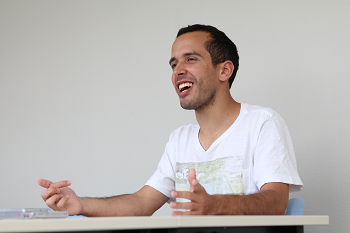
What did you study in Brazil?
My major was computer science. My university in Brazil has various departments within the field of engineering such as computer science and electrical engineering that are each independent of one another. At first, I had planned to enter the electrical engineering department, but after some research I realized that the computer science department required higher examination scores in order to matriculate. I figured that I wanted the challenge and so I chose computer science. Quite a strange reason for choosing one’s major, if I do say so myself. However, I guess that I had the dream of designing computer software at the time, so I guess it was the right choice after all.
How would you compare your student life in Japan to Brazil?
It’s difficult to compare the two. However, the classes and examinations in Brazil are definitely more difficult. It is not rare to have a matriculating class of fifty and the same graduating class reduced to five students. For example, when looking at the list of students registered for a 3rd year course, it is common to see students from various grade levels. In other words, the older students have failed the course beforehand and are taking it again for the second or third time. It really is that difficult. But given that the education at national universities in Brazil is free, not many students participate in part-time jobs, and in that respect I think that Japanese students excel. Japanese students are not only busy studying, but busy living life. Whether in Brazil or Japan, we are all busy doing something, eh? And in Brazil there are also not many club activities, so we tend to just do as we please after school. I usually would just watch dramas or play games on my laptop after class, or hang out with friends.
Speaking of that, did you learn Japanese by watching dramas before coming to Japan?
Yes. I learned Japanese by myself by watching dramas such as “Ichi Rittoru no Namida,” “Nobuta wo Produce,” and “Hanzawa Naoki.” Although some dramas were difficult to understand, I was certainly able to grasp some meaning, even if not every small detail, by watching these thoroughly. With some guesswork I could get the gist of it: “Ahh. The main character is in some sort of predicament, and is now trying to expose his/her rival for their wrongdoings.” Japanese is typically taught to a group, and that group must meet in the same classroom at the same time. But when watching dramas I can study at my own pace, whenever I want. I think that suits me well.
Why did you decide to come to Japan?
It is thanks to my friend. They had wanted to apply for the same program that I am currently in and had finally been accepted after three tries. I had applied to go together with them. Actually, while I was studying abroad in France I had begun studying Japanese. I did not have any intention of going to Japan at that time, but I just had vague ideas of wanting to study abroad again elsewhere.

How was your study abroad in France?
As I had lived alone for the first time while in France, I realized that this is the type of lifestyle that suits me. I spent six months attending classes and the next six working on my own research. I was also able to research at my own pace, and because I like to do things in such a way I can call this study abroad experience a fulfilling one. Some people become lazy if they are given such free reign in an assignment, but if I am given freedom I am able to use it well, creating rules for myself and going at my own pace. In my free time, I played badminton and, for the first time, was involved in an international relationship! I truly fell in love, despite there being lingual and cultural differences between us, and I consider this one of the best relationships I have ever had. I remember crying for days after we had broken up. Yet, I am still proud of the relationship we had - a love that was ideal in every way.
I see. Could you tell me a bit about the “Learning Engineering” that you are involved in in your major?
My research in Learning Engineering is to create computer software that enhances the learning environment for children. There are many different types of software out there, so let me explain in more specific terms what I am working on. You are given a set of cards, and depending on the way in which you arrange them you can create your own animation. The first card illustrates two birds, the second card shows two flying birds, and the third card is blank - or, in other words, nothing is there. This can be made into a sequential animation, and the tale of “two minus two equals zero” is easily visualized. Using this type of programming, children are able to experience arithmetic in a more tangible way.
This type of learning is important to a child’s development. The reason being if a child does not understand why they are learning what they are learning, they will memorize information in a mechanical way. There are many children in these circumstances, who are required to move onto the next stage in their learning before having properly absorbed the fundamentals. And the further they move ahead, the farther they fall behind. If you ask me, the reason why many people have poor math skills is exactly because of this. It has nothing to do with whether the student is “capable” or not. It is difficult to teach the fundamental concepts of mathematics. Some children pick up these concepts quickly, whereas some do not. For those children I would like to create software that can help. I want to help children come into contact with mathematics, its conceptual framework, and to develop “number sense” through computer software.
Speaking of number sense, let me explain this term in a little more detail. Starting in the USA, the department of education labeled it as the first item on the agenda for children’s elementary mathematics education. “Numbers” are primarily a way to express “measurements,” right? For example, if we were asked, “which is larger: 7 or 9?” we would of course answer by saying 9. However, there are many children who would not understand the question, the intention behind it - in other words, there are children who have not developed a “sense” of what numbers represent. That is just the unfortunate reality. On the bright side, some countries have come to see this as problematic and are trying to do something about it. Thus we have come to call this understanding, or misunderstanding, of numbers as “number sense.”
In other words, if one has not acquired “number sense” they cannot differentiate the size of “7” and “9”?
That’s right. Let me give another simple example. If I were to ask you to add together 0.998 and 0.989, about how much would that be? Just give an estimate.
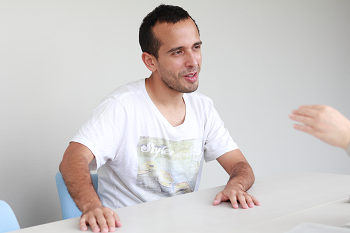
About 2, right?
Exactly. It seems that you have developed good number sense. However, if you were to ask the same question to a child who has not yet developed such an understanding of numbers, he or she would begin calculations to try to figure out the precise amount. Even though I just said to estimate the answer.
I see.
As I said before, I am trying to develop software that helps children to develop better number sense. But, as this is reality and not some fantasy world, there are no clear methods such as “eat this and you will succeed!” or “wear this and problem solved!” And no matter how amazing a piece of software may be, it would be a lie to say that it will work for everyone. Perhaps it will work for a portion of students, but it is necessary to think of another approach for the rest. To be of some help to even just a few students, though, is what motivates me to create such software. For the children who are not as quick to gain an understanding of numbers, they may benefit from the software I create and then go on to fall in love with numbers or perhaps become a mathematician. You never know what might happen. I do not want to rob such a future away from children by letting this software go uncreated. I would be happy to shed a love of numbers to just one child, a child who may have otherwise hated numbers by no fault of their own. That is why I am doing this research.
I see. Could you tell me about your impression of classes at Hiroshima University?
Japanese students are on the quiet side, eh? I do think it is quite a wonderful thing that classes are never interrupted by students chatting to one another (up to now this is all compliments), but Japanese students, except in rare cases, tend not to ask questions or voice their opinions. The students are just silent, and only the professor talks. At first I used to wonder if everyone was alright or not. “What is up with this?” I often thought to myself. Usually there is some sort of “classroom participation” required for grading purposes, and those who participate will exceed in this respect. When this is weighted more heavily, students participate, but when it is not, students are quiet and reserved. I find that my research lab is no different. I am the only one who voices opinions on what should be done differently to better the lab. That is not to say that the others are opinion-less. Rather, they are just quiet. But why? Japanese people might just be too constrained by their position, their rank. Maybe they are just unable to say what they really want to say. At least that is what I have come to think.
What about yourself? Why do you think you are able to express your true feelings even while in Japan?
Well, that is because I just happen to possess a magic wand. I call it “the power of being a foreign student.” It is indeed a tremendous power to possess here in Japan. The same power was not very effective while I was in France, though.
What does that mean, to possess “the power of being a foreign student”?
To put it simply, us foreign students are able to surmount the same “barriers” that may prove formidable to Japanese people with ease. Like I said before, if there is something that someone wants to say but instead chooses to keep their mouth shut, that is because they have created a “wall” between themselves and those around them, right? It takes bravery to put yourself out there, in front of the eyes of your fellow classmates. Whether that is in terms of the clothing you wear or the actions you make. However, this is particularly true for Japanese people, who are raised in a culture in which one should always be mindful of one’s surroundings. But I am different. While Japanese people may monitor and reprimand each other in terms of manners and attitudes, they will overlook us foreign students, easily forgiving us if we do not behave appropriately. Of course, it is not allowed for anyone to break universally agreed upon rules, or to cause trouble for or to show disrespect to other people. But I feel the very people who are trying to protect certain manners and behaviors may never question why they are doing so, or what the purpose is of doing so.
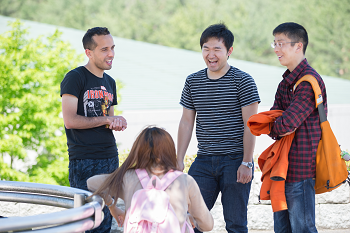
I believe that I, as a foreign student in Japan, have a mission that I must accomplish. There are things that only I can do to make improvements to my research lab, as well as to Japan, during the time that I am here. Thus I am doing my utmost to voice my opinions and to point out problems whenever they arise. The power of being a foreign student is exactly for that purpose. Japanese students may build walls between themselves and their professors, choosing not to say what they think in front of them. However, in truth, the professors are waiting to hear opinions from their students. Yet, the students choose to hold back. I think that is a problem. Especially when it comes to the world of research, in which “walls” are just nuisances. Though most Japanese students believe that it is the professor who should teach the student, I believe that teaching and learning goes both ways - that is, both ways between the student and the professor. Of course it is the teacher who holds more experience and knowledge, but what teacher would ever say that there is nothing to be learned from a student. When it comes to research, there are many different viewpoints regarding the way in which something should be done, and hearing students’ opinions is, of course, valuable. Thus, for the sake of research and discovery, the student can be of great help to the teacher. I would like it if Japanese students made a little more effort to let their voice be heard.
Do you have any advice for Brazilian or Japanese students who are considering a study abroad?
Well, for example, there are many people who might give up on the opportunity to study abroad in the United States due to not having much confidence in their English abilities. There are also many people who may feel uncomfortable about the idea of studying abroad. However, I think that it is a worthwhile experience for anyone. Preparations beforehand? Mental readiness? No way! I am just not that type of person (laughter)! As long as you submit the necessary documents, that is enough, right? Also, be prepared to spend some money. With all that said and done, you can do anything that you want! There is no need to try to come up with other things to worry about. Are you worried that you might mess up or make a mistake? It’s alright, just stop worrying! After all, you will absolutely make mistakes. No matter how much time you put into your preparations, you cannot avoid making mistakes. You may come face to face with cultural misunderstandings, get in arguments with your friends, feel sad at times . . . but this is how you learn. So, for the time being, just go and study abroad. That is the most important step: just going.
Last of all, would you share with us your biggest dream?
I would like to create a video game that is truly impressive. One with a story so moving that it gives players goose bumps.
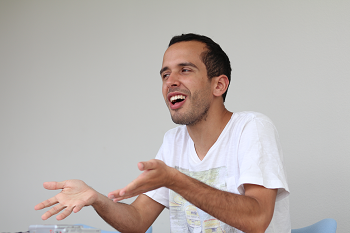
That is indeed something to look forward to! Thank you very much for your time today.
Thank you!
Photo Gallery
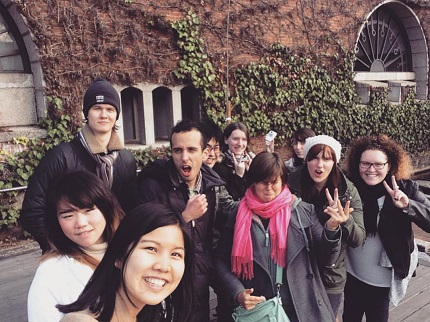
Trip to Kurashiki: us being boss rock stars
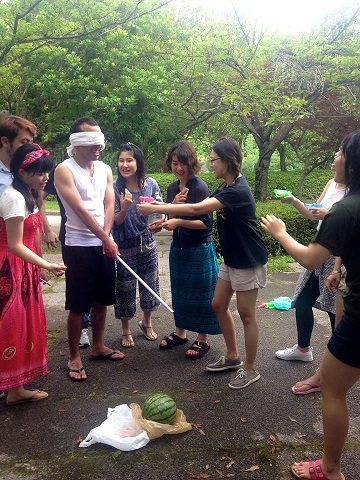
Friend’s birthday: Trying, and failing, to break open a watermelon at Kagamiyama Park
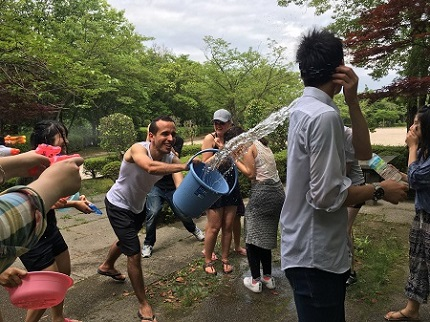
Friend’s birthday: Water party on a hot summer day
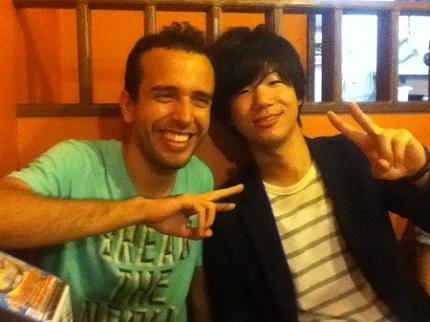
Me and my awesome teacher, Hayato-sensei, from a Japanese class taught by Japanese university students

Running into my friend Justin at the Asean Festival. Glad to have seen him!


 Home
Home